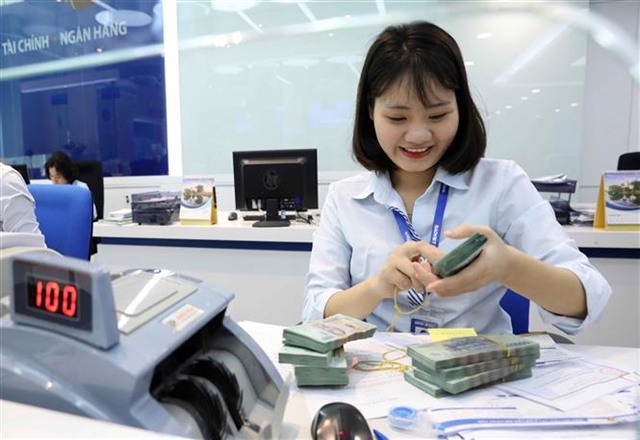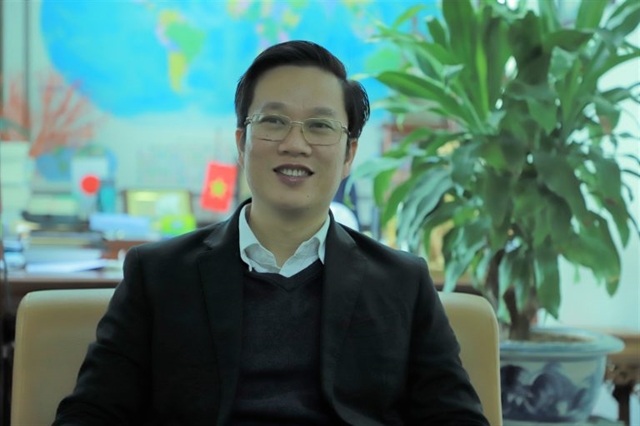 Economy
Economy


|
| Hà Minh Hiệp, deputy director general of the General Department of Standards, Metrology and Quality. — Photo tcvn.gov.vn |
Hà Minh Hiệp, deputy director general of the General Department of Standards, Metrology and Quality (Ministry of Science and Technology) speaks to Vietnam News Agency about the role of innovation and creativity in economic development.
Innovation plays an important role in the country's economic development. What strategy does Việt Nam have to promote international cooperation on innovation as well as the General Department of Standards, Metrology and Quality's plan in 2022 to support innovation in Việt Nam?
International cooperation on innovation is being strongly deployed and is a big trend that the Government and State are interested in and implementing in Việt Nam. The Ministry of Science and Technology has invited experts from government agencies, relevant ministries, associations, universities, research institutes and enterprises to actively participate in developing standards according to the standards of the technical committees of the International Organization for Standardization (ISO) for creativity and innovation related to automation, digital commerce, e-commerce, smart manufacturing in order to grasp the latest trends and advise for the Government on innovation.
In 2022, the General Department of Standards, Metrology and Quality will continue to discuss with members of international and regional organisations about professional activities including innovation. Within the framework of Asian Productivity Organisation (APO), in 2022, member countries will continue to exchange experiences on productivity and innovation for the digital economy, standards and frameworks for innovation management in the organisation, innovative business models for rural tourism, innovative technologies for the agri-fresh produce supply chain, and innovative smart agriculture models. At the same time, the general department will continue to exchange bilateral and multilateral cooperation on standardisation in the fields of emerging technologies, e-commerce, digital commerce, and smart manufacturing.
As the APO President for the term 2020-2021, what plans did Việt Nam have to promote innovation in the APO as well as the 21 member economies?
Việt Nam chaired the research of Innovation Management Needs Assessment with the participation of leading experts from 10 member economies. The research results showed the picture of innovation management in each economy in the region and make recommendations to APO on training programmes and implementation projects applying the innovation management system in organisations/enterprises. This is also one of the important goals of the APO Vision 2025.
In the 2020-21 term, the COVID-19 pandemic limited and hindered many APO's cooperation activities. However, sharing experiences in promoting innovation of member economies through online seminars, research were still strongly rolled out by APO, attracting a large number of participants, and proposing breakthrough ideas for the upcoming period.
APO is also an organisation that actively organises seminars on innovation in agriculture, industry, etc.
Can you share experience as well as outstanding international cooperation activities in the region?
The transformation to a digital economy in the context of globalisation leads to new approaches based on innovation and technological innovation. Growth based on capital, resources, and labour in the context of increasingly shrinking natural resources has become no longer appropriate. Many countries around the world have chosen to switch to a growth model based on productivity development and innovation. In fact, this is the factor that helps economic growth in a sustainable way.
Within the cooperation framework of APO, member economies have discussed and researched solutions to increase productivity through innovation and reform management model and expand the capacity to apply new practices and technologies.
APO has also promoted research by its members to advise on building a regulatory environment that promotes innovation. APO has supported Việt Nam to develop an innovation-based productivity development master plan approved by the Government in the period of 2021-2030. The national productivity master plan is the APO's initiative to help member economies develop goals, strategies and actions that enhance productivity. The productivity master plan also contributes to the inclusion of productivity in national development programmes, enhancing the role of productivity in the socio-economic development of each APO member country. The plan will propose actions that need to be taken by different agencies in Việt Nam to promote innovation activities, strengthen links between foreign-invested enterprises and domestic enterprises, building capacity to absorb human capital, upgrading information and communication technology and logistics infrastructure, and allocating resources.
Strengthening quality infrastructure is one of the key factors to improve productivity, quality and promote innovation through standardisation in new industries such as the internet of things (IoT), blockchain, e-commerce, digital commerce, 3D printing, smart manufacturing.
Việt Nam has cooperated with Australia and the US on standardisation in 3D printing, and with ASEAN to build a roadmap and measures to deploy smart manufacturing.
ISO has developed the ISO 56000 series of international standard on innovation management system. Can you talk more about this set of standards and the benefits of applying it?
Several standards have been issued regarding innovation management such as terminology, tools and methods. This set of standards is intended to assist organisations in promoting innovation systematically. It provides a lexicon, fundamental concepts, principles of innovation management, and an approach to implementing innovation management.
ISO 56000 is designed to provide a general framework for all organisations, regardless of type, sector, or size, whether established, temporary or starting, toward the successful implementation, maintenance, and continual improvement of an innovation management system.
The set of standards is especially useful to small and medium-sized enterprises, which often lack the technological know-how, governance methods and resources to carry out innovation activities.
ISO 56000 provides all information that business leaders need to create an innovation system in their organisations through analysis of core competencies of the business including strategy, culture, process, tools and techniques and measurement. — VNS